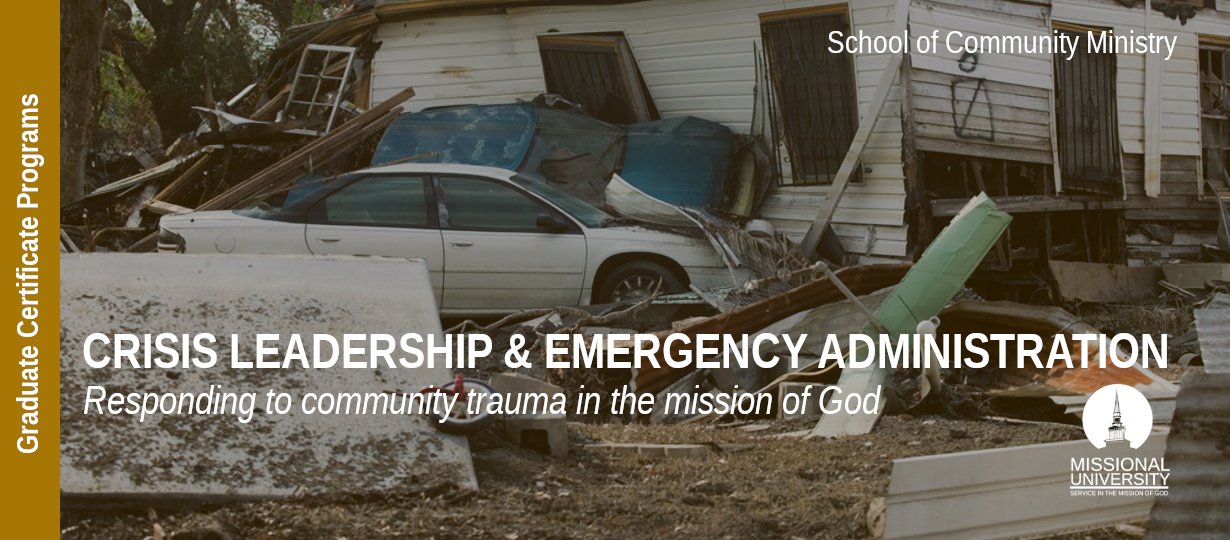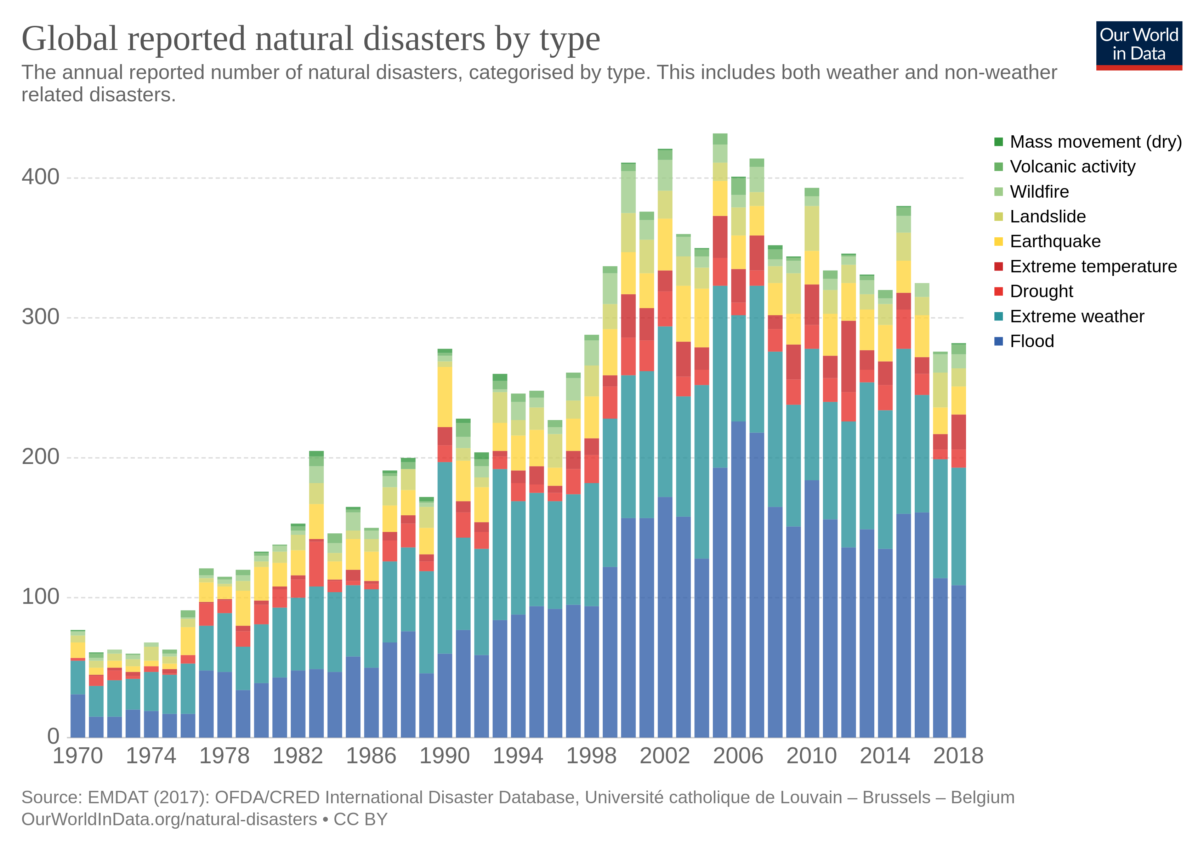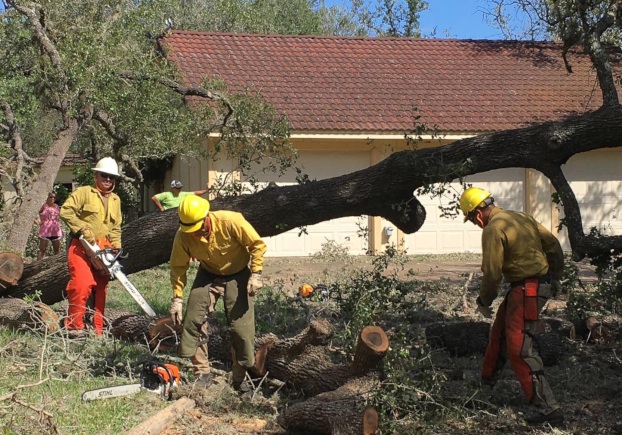
Online Graduate Certificate in
Crisis Leadership and Emergency Administration
⚜ Rarely Offered in Christian Universities, Bible Colleges or Seminaries
Expand Your Missional Service Today!
REQUEST INFORMATION
Ready to learn more about the
Graduate Certificate in
Crisis Leadership and Emergency Administration?
LEARN MORE NOW
This 21-credit Graduate Certificate in Crisis Leadership and Emergency Administration provides knowledge and skills that can be immediately applied by missional Christians who serve around the world as community ministry providers, crisis & disaster chaplains, denominational disaster relief personnel, public safety personnel, emergency planners, emergency responders and other professionals in disaster preparedness, response and management. Graduates gain knowledge and leadership skills in working within the management models and operational structures unique to disasters including: risk assessment and management, crisis outreach & community resilience training, methods of planning for disaster response, incident command and collaboration, and spiritual caregiving in crises and disasters. Taught by Christian experts in public theology, crisis & disaster relief, and public safety and security, the program equips students to demonstrate the love and compassion of God by serving communities in trauma while also providing spiritual care.
 Low-frequency, high-impact events such as earthquakes and tsunamis are not preventable, but such high losses of human life are. We know from historical data that the world has seen a significant reduction in disaster deaths through earlier prediction, more resilient infrastructure, emergency preparedness, and response systems. However, those at low incomes are often the most vulnerable to disaster events: improving living standards, infrastructure and response systems in these regions are essential to preventing deaths from natural disasters in the coming decades. (Source: Hannah Ritchie and Max Roser (2020) - "Natural Disasters". Published online at OurWorldInData.org.)
Low-frequency, high-impact events such as earthquakes and tsunamis are not preventable, but such high losses of human life are. We know from historical data that the world has seen a significant reduction in disaster deaths through earlier prediction, more resilient infrastructure, emergency preparedness, and response systems. However, those at low incomes are often the most vulnerable to disaster events: improving living standards, infrastructure and response systems in these regions are essential to preventing deaths from natural disasters in the coming decades. (Source: Hannah Ritchie and Max Roser (2020) - "Natural Disasters". Published online at OurWorldInData.org.)
With the global increase of natural disasters, missional Christians are needed across the world to serve in the mission of God through responding to community trauma. Through the Graduate Certificate in Crisis Leadership and Emergency Administration, you gain the understanding and skills necessary to lead in community emergency management and incident command.
Program Features
-
Integrated practicums allow you to gain valuable real-world experience
-
Learn from academic practitioners from around the world
-
Credits earned in this certificate program can apply to a Missional University Master's degree program
Course Effort
Course Length
Credits Required
Program Cost
What Will I Study?
We offer the most comprehensive approach to responding to community trauma in the mission of God.
The role God intends for humanity in developing community and society as part of His created order will be explored. It will examine the theological doctrines of Creation, Fall, and Redemption, and the cultural mandate as the basis for humanity’s involvement in community. Students will engage in analytical discussions, research, and presentations on the theology of Christian social engagement.
This course will provide a thorough understanding of the effects of crises and disasters on local communities and the broader society as whole, including the effects on the recovery process.
This course will provide students with an examination and analysis of how risk assessment and risk management issues relate to community resilience, social, economic and political vulnerabilities, and ethical responses. Students will also analyze the role of public managers engaged in the safety of their local communities to the national level.
This course will explore various methods for conducting public outreach and education regarding general disaster and emergency preparedness at an advanced level. In addition, students will be equipped to apply principles of community relations for non-profits and how these can be applied in a crisis or disaster.
Students will demonstrate a comprehensive understanding of the National Response Framework and its objectives and purpose as well as learn the roles of local, state and federal government in disaster response. The student will also be introduced to the Incident Command System and methods of planning for disaster response.
This course provides graduate-level knowledge to improve critical thinking and decision making skills required in planning for and the management of disasters and other critical incidents. This course will place an emphasis on the collaboration of various emergency services (e.g. police, fire, EMS, FEMA, nonprofit, and volunteer organizations).
This course will assist the student to develop an advanced understanding of how to provide spiritual caregiving in crises and disasters and it will equip them to support and/or participate in such ministry in either a professional or voluntary capacity. Emphasis will be placed on the various models of crisis intervention that are currently being practiced.
Optional Additional Courses
Students will demonstrate an advanced understanding of the role of community volunteers and religious organizations in response to crises, including the mitigation of the results of a disaster and the recovery process.
This course will provide a thorough understanding of the effects of crises and disasters on local communities and the broader society as whole, including the effects on the recovery process.
This course explores the nature of geological and meteorological hazards and their impact on society, human life and other life forms. Students gain experience pursing solutions to addressing economic and social risks. Topics may include landslides, floods, tsunamis, volcanic eruptions, earthquakes, and severe storms.
This course will expose studnets to common water problems especially in the underdeveloped world, and the diseases that arise due to poor sanitation, as well as some of the solutions and resources that improve such situations
When Can I Get Started?
We offer multiple start dates each year to give you flexibility in your education, life and work schedules.
JANUARY
MARCH
MAY
AUGUST
OCTOBER
A Career in Transforming Communities
Is this Your Mission?
Disaster Preparedness Manager, Disaster Preparedness Specialist, Disaster Program Specialist, Disaster Program Manager, Disaster Recovery Manager, Disaster Risk Reduction and Humanitarian Emergency Affairs Manager, Emergency Management Coordinator, Emergency Management Program Specialist, Emergency Management Specialist, Emergency Preparedness Specialist, Emergency Response Team Leader, Emergency Services Director, Environmental Health and Safety Manager, Hospital Emergency Preparedness Administrator, Hurricane Program Manager, Safety Specialist, Sr. Disaster Program Manager, Public Health Preparedness Coordinator, Public Information Officer, Senior Director-Response & Recovery Programs
Request Information Now
How Much Will it Cost?
We offer tuition based upon country of residence. According to the Human Development Index, all countries around the world fall into one of four categories:
-
(Tier 1) - Very High Human Development
-
(Tier 2) High Human Development
-
(Tier 3) Medium Human Development
-
(Tier 4) Low Human Development
Our tiered global tuition makes higher education affordable for everyone world wide.

TIER COUNTRIES
100% Tuition
$395
per credit hour
3 credit course
$1185

TIER COUNTRIES
80% Tuition
$316
per credit hour
3 credit course
$948

TIER COUNTRIES
60% Tuition
$237
per credit hour
3 credit course
$711

TIER COUNTRIES
40% Tuition
$158
per credit hour
3 credit course
$474
Tiered tuition based on country of origin and scholarships available. Find your country of residence here for more information.
Tuition may be further reduced by participating in the Sponsorship Program.
